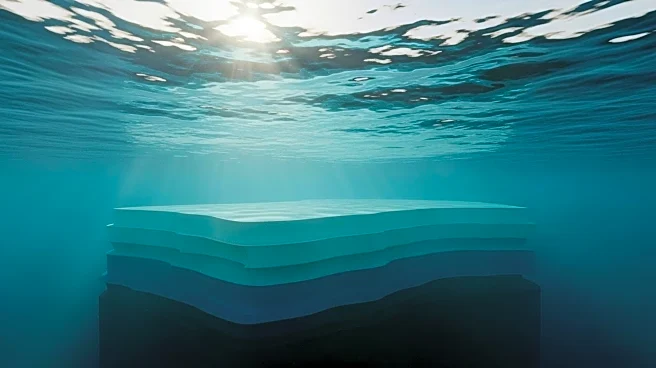What is the story about?
What's Happening?
Recent research published in Geophysical Research Letters highlights the importance of ocean stratification in reversing the decline of Antarctic sea ice. Since 2014, satellite observations have documented significant losses in sea ice extent. The study, led by Sirui Li from the Ocean University of China, suggests that the initial thickness and stability of ocean layers play a critical role in determining whether sea ice loss can be reversed under various carbon dioxide emission scenarios. Strong stratification, where lighter, colder surface water lies atop warmer, saltier water, can trap heat near the surface, inhibiting ice formation and accelerating melting. The research utilized climate model experiments to explore different future carbon dioxide stabilization and reduction pathways, revealing that stronger initial stratification leads to more heat retention in the surface ocean layer, creating a positive feedback loop that exacerbates sea ice loss.
Why It's Important?
The findings underscore the complex interplay between ocean stratification and carbon dioxide emissions in influencing Antarctic sea ice dynamics. The loss of sea ice has far-reaching implications for global climate, ocean circulation, ecosystems, and sea level rise. Reduced ice cover increases open water areas that absorb more solar energy, further warming the ocean and potentially accelerating ice shelf melting. This can lead to increased discharge of land ice and contribute to rising sea levels. Additionally, sea ice supports specialized ecosystems, posing risks to organisms dependent on its presence. The study calls for improved observations and modeling of ocean stratification to better predict future sea ice changes and inform policy decisions aimed at mitigating climate impacts.
What's Next?
The research suggests that reversing sea ice loss is possible if significant carbon dioxide reductions occur promptly and if ocean stratification remains weak enough to allow cooler surface waters to promote ice formation. The study advocates for enhanced monitoring of subsurface temperature and salinity, meltwater fluxes, and ocean-atmosphere interactions to refine climate models and improve predictions. Policymakers and climate modelers are encouraged to prioritize ocean stratification as a central factor in addressing Antarctic sea ice loss and its broader environmental consequences.
Beyond the Headlines
The study highlights the need for a nuanced understanding of ocean stratification's role in climate dynamics, emphasizing its potential to influence long-term shifts in global climate patterns. The research points to the importance of integrating high-resolution measurements and advanced modeling techniques to capture the complexities of ocean layering and its impact on sea ice and climate systems.














